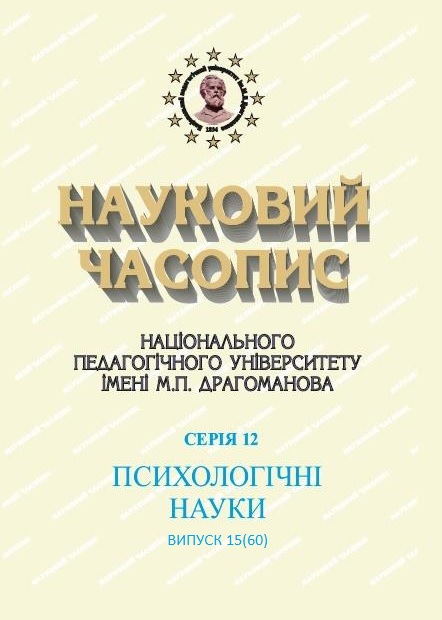PSYCHOLOGICAL ASPECTS OF SOCIO-PSYCHOLOGICAL CLIMATE FORMATION IN CHILDREN SPORTS GROUP
DOI:
https://doi.org/10.31392/NPU-nc.series12.2021.15(60).01Keywords:
social and psychological climate, sports group, children collective, sports collective, sports children group.Abstract
This article is dedicated to theoretical analysis of separate psychological aspects of socio-psychological climate formation in a children sports group. The following methods are used in theoretical and methodological research: theoretical analysis, synthesis, comparison, generalization, systematization of the main provisions of psychological and pedagogical science about socio-psychological climate in children sports groups to substantiate the peculiarities of practical psychological climate formation in children sports group. The psychological climate in a sports group is determined to be a relatively stable setting of the whole team, which permeates the entire system of activities and is formed on the basis of subjective satisfaction with the nature of interpersonal relationships of athletes. Indicators of the psychological climate in sports groups are: attitude of young athletes to training and competitive activities; formation of optimal personal qualities of athletes; presence of psychological compatibility; optimal coach’s leadership style influences on the climate in the group, etc. Socio-psychological climate in the children group significantly affects their personality, success in joint activities with other members of the group (education, upbringing, sports, collective creative work), the formation of adequate self-esteem, the creation of a favorable atmosphere of interpersonal relationships. It is established that in the process of forming a favorable climate in a children sports group, the work of teachers and psychologists is important, who should support children and help establish a favorable psychological climate in their team. At the same time, the most important condition for the formation of a favorable or correction of an unfavorable psychological climate is the integration of educational influences on the children group into a single system that ensures the continuity of these processes. Also for this activity it is necessary to use special forms which include: thematic training sessions aimed to improve the group atmosphere; business games aimed to develop a joint collective decision; organization and holding of various general group and public events, etc.
References
- Brynzak, S. (2006). Psykholohichna sumisnist ta yii otsinka v sportyvnii komandi. Moloda sportyvna nauka Ukrainy : zb. nauk. prats z haluzi fiz. kultury ta sportu. Vyp. 10. T. 4. 36–40. [in Ukrainian].
- Vins, V. & Kanharaieva, K. (2020). Osoblyvosti formuvannia spryiatlyvoho psykholohichnoho klimatu v sportyvnii dytiachii hrupi v konteksti vprovadzhennia inkliuzyvnoi osvity. Praktychna psykholohiia v inkliuzyvnomu seredovyshchi: Zbirnyk naukovykh statei Mizhnarodnoi naukovoi internet-konferentsii. Pereiaslav: Vydavets Ya. M. Dombrovska. 207-212. [in Ukrainian].
- Honcharenko, V. (2019). Doslidzhennia sotsialno-psykholohichnoho klimatu futbolistiv na etapi poperednoi bazovoi pidhotovky. Slobozhanskyi naukovo-sportyvnyi visnyk: Materialy XIX Mizhnarodnoi naukovo-praktychnoi konferentsii «Fizychna kultura, sport i zdorovia: stan, problemy ta perspektyvy». 6K. 26–28. [in Ukrainian]
- Kenani, S. B. (2005). Indykatory psykholohichnoho klimatu sportyvnoi komandy (Avtoref. dys. kand. nauk z fiz. vykhovannia i sportu). Kyiv. [in Ukrainian]
- Krichevskij, R. L. (2009). Socialnaja psihologija maloj gruppy. Moskva: Aspekt Press. [in Ukrainian].
- Monahova, K. V. (2009). Vlijanie individualno-korrekcionnoj raboty na vzaimootnoshenija v sportivnoj komande. Mir obrazovanija – obrazovanie v mire. 2. 253–259. [in Russian].
- Odorozha, S. M. (2016). Sotsialno-psykholohichni osoblyvosti vidnosyn sportyvnoi hrupy. Sotsialno-psykholohichnyi ta filosofskyi pidkhid do problem suchasnoho suspilstva : materialy nauk. konf, Sievierodonetsk : SNU im. V. Dalia, 112–113. [in Ukrainian].
- Okseniuk, I. (2017). Znachennia faktoriv psykholohichnoi sumisnosti u vzaiemovidnosynakh mizh trenerom ta hravtsiamy futbolnoi komandy. Nova pedahohichna dumka. 3 (91). 71–73. [in Ukrainian].
- Palinichak, O. I. Shliakhy formuvannia optymalnoho psykholohichnoho klimatu v pedahohichnomu kolektyvi [Elektronnyi resurs]. Rezhym dostupu: http://www.library.kherson.ua/klas/18/pedagog_skarbnychka/metod_porady/palinichak.doc. [in Ukrainian].
- Tulyna, O. O. (2005). K voprosu o formyrovanyy kollektyva uchashchykhsia. Sbornyk nauchnыkh trudov Severo-Kavkazskoho hosudarstvennoho tekhnycheskoho unyversyteta. Seryia «Humanytarnыe nauky». 2 (14). 129–135. [in Russian].
- Fedyk, O. V. (2013). Psykholohiia sportu : materialy dlia samopidhotovky do seminarskykh zaniat dlia studentiv spetsialnosti «Psykholohiia». Ivano-Frankivsk : Inin. [in Ukrainian].

